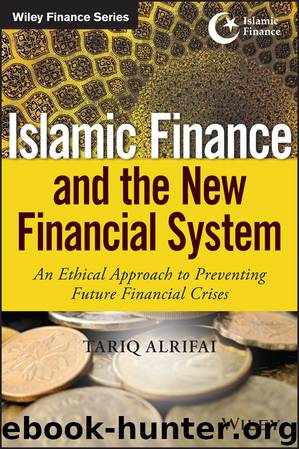Islamic Finance and the New Financial System: An Ethical Approach to Preventing Future Financial Crises by Tariq Alrifai

Author:Tariq Alrifai [Tariq Alrifai]
Language: eng
Format: epub
Publisher: Wiley
Published: 2015-06-01T16:00:00+00:00
North America
The seeds of Islamic finance were planted early in North America. Though there are no Islamic banks in the United States and Canada, community-based Islamic investment and finance companies have been around since the 1980s. In Canada, for example, the small but growing Muslim population in Toronto set up the Islamic Housing Co-Operative 1980, which is still active today and is called Ansar Co-operative Housing Corporation. The cooperative's goal is to serve Muslims living in Canada, by pooling their funds to enable them to offer home financing solutions. Banks at the time were not interested in serving this market. Other Shariah-compliant mortgage providers popped up over the years, including a company called UM Financial, which went bankrupt in 2011 under a cloud of shady activities.21 This damaged the reputation of all other Islamic financial services companies operating in Canada and has been a major setback to the industry. Prior to this, community leaders and investors were in discussion with regulators to allow for an Islamic bank to be licensed along the same path as in the United Kingdom. However, the headlines the UM Financial fiasco attracted put the brakes on this for the foreseeable future.
Islamic finance has been more successful in the United States. The industry there also got its start through community-based groups that went on to form financial services companies. One of the first such groups was the North American Islamic Trust (NAIT), founded in 1973 as a not-for-profit endowment fund to help build, finance, and manage the growing demand for mosques in the country. In 1986, NAIT was responsible for helping to start the first Islamic mutual funds in the United States, which are managed by Saturna Capital, based in Washington state. The firm currently manages close to $3.5 billion in three Islamic mutual funds,22 with a vast majority of investors being non-Muslim.
Another early pioneer in the United States is Lariba American Finance House, founded in 1987 in Pasadena, California.23 The group's aim was to help Muslims buy a home or invest in a business in accordance with Shariah principles. The company is still active today and has gone on to purchase Bank of Whittier, a local bank in California. The bank is not an Islamic bank, since regulators in the United States do not issue Islamic banking licenses; it currently operates as a conventional bank that also offers Shariah-compliant services, such as home financing.
The 1980s and 1990s saw a wide range of companies and community-based initiatives looking to offer Islamic financial services. In 1996, the Ameen Housing Co-operative was launched in Palo Alto, California, and was modeled after the housing cooperative in Toronto. In 2001, I joined HSBC to manage the launch of its Islamic banking initiative in the United States, beginning in New York state. We successfully launched in March 2002 and attracted a lot of headlines for the move, especially in light of the tragic events on September 11, 2001. While I was there, we launched other banking services to meet the needs of the Muslim market and went on to develop investment solutions as well.
Download
This site does not store any files on its server. We only index and link to content provided by other sites. Please contact the content providers to delete copyright contents if any and email us, we'll remove relevant links or contents immediately.
International Integration of the Brazilian Economy by Elias C. Grivoyannis(111059)
The Radium Girls by Kate Moore(12028)
Turbulence by E. J. Noyes(8051)
Nudge - Improving Decisions about Health, Wealth, and Happiness by Thaler Sunstein(7707)
The Black Swan by Nassim Nicholas Taleb(7129)
Rich Dad Poor Dad by Robert T. Kiyosaki(6633)
Pioneering Portfolio Management by David F. Swensen(6301)
Man-made Catastrophes and Risk Information Concealment by Dmitry Chernov & Didier Sornette(6019)
Zero to One by Peter Thiel(5802)
Secrecy World by Jake Bernstein(4753)
Millionaire: The Philanderer, Gambler, and Duelist Who Invented Modern Finance by Janet Gleeson(4478)
The Age of Surveillance Capitalism by Shoshana Zuboff(4293)
Skin in the Game by Nassim Nicholas Taleb(4250)
The Money Culture by Michael Lewis(4207)
Bullshit Jobs by David Graeber(4191)
Skin in the Game: Hidden Asymmetries in Daily Life by Nassim Nicholas Taleb(4007)
The Dhandho Investor by Mohnish Pabrai(3765)
The Wisdom of Finance by Mihir Desai(3748)
Blockchain Basics by Daniel Drescher(3583)
